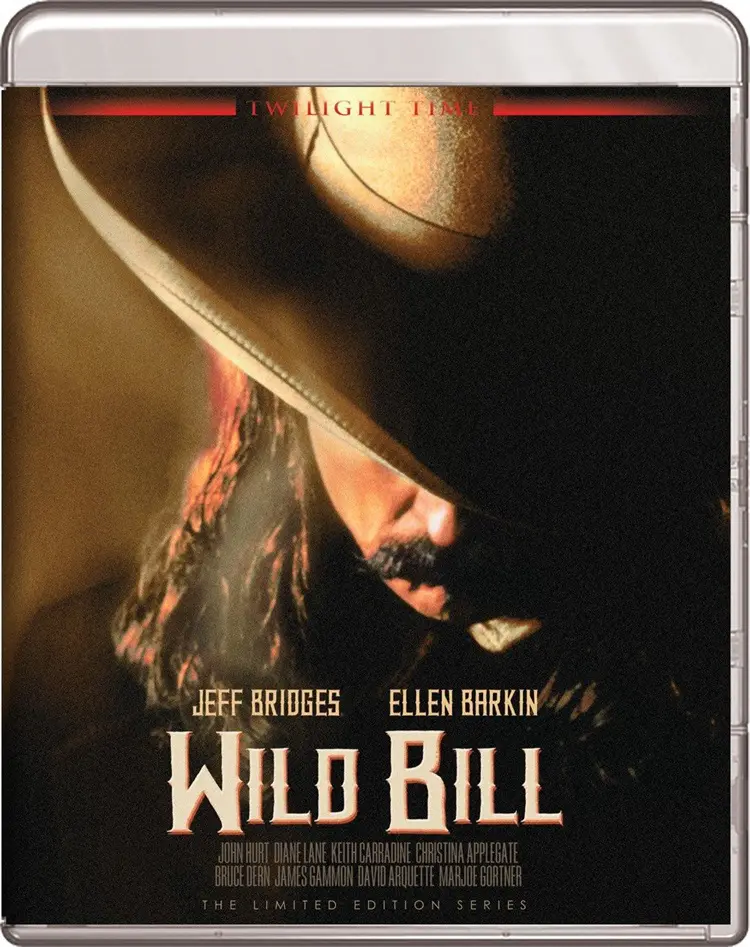
Although it was never a title I saw when it was initially released, Walter (The Warriors) Hill’s Wild Bill has always lingered in the back of my mind for an utterly absurd reason. Following an extremely limited release in cinemas (spoiler alert: it bombed), the film hit the shelves of a video rental outlet I was managing at the time. It was a decidedly rural area, where just about anything western was considered a keeper by the locals, the majority of whom were about as “hick” as could be. One memorable afternoon, a middle-aged gentleman came in to return the videocassette of Wild Bill he had rented, wherein he lamented they ruined the movie by ‒ wait for it ‒ opening the film with Wild Bill Hickok’s funeral.
For him, it was a major spoiler to the ending of the film, which was nothing short of hilarious to me. I recall standing there, dumbfounded over the all-too-apparent fact that the rustic ruralite who rented a movie entitled Wild Bill seemingly had no clue who Wild Bill Hickok actually was. Over the course of the next two decades, I would always chuckle to myself (or at least shake my head) whenever I saw the cover art. I could never get the notion someone who lived in a western community didn’t know squat about Wild Bill Hickok. Ironically, when I finally experienced the film for the first time ‒ a good 23 years after its release ‒ I had to stop and wonder if the people who made Wild Bill even knew who Wild Bill Hickok was.
Not that it’s that bad, mind you. But it certainly isn’t a masterpiece by any means, that’s for certain. Released in the dusty wake of Hollywood’s gracious return to the western genre in the early ’90s, Wild Bill is probably best described by the old adage of “Too little, too late.” By the time the production had been approved, filmed, and released, the brief resurgence of the cowboy picture had already peaked and waned, thanks in no small part to one of Kevin Costner’s routinely over-budgeted, bloated box office stinkers, Wyatt Earp, in 1994. Needless to say, when Wild Bill finally managed to pull itself up by the bootstraps and roll out onto screens the following year, the public was officially “over it.”
Here, the great Jeff Bridges himself portrays one of the Old West’s most valuable players, James Butler “Wild Bill” Hickok. Like the revisionist westerns that had preceded it in the ’70s, Wild Bill finds the iconic folk hero in the final stage of his famous life. Culled from various stories ‒ be they historical or fictional, as even Mr. Hickok himself was said to have been prone to exaggerating his own exploits ‒ Hill’s Bill focuses on the final days of the infamous long-haired gunman. When he isn’t having foreshadowing nightmares or coming to grips with his failing eyesight, Bridges’ Bill is busy with a love me/leave me relationship he shares with the legendary Calamity Jane ‒ the latter of whom is played (rather perfectly) by Ellen Barkin.
But that all changes ‒ eventually, that is, as the 98-minute feature from United Artists seems to run much longer ‒ when a young upstart named Jack McCall (a decidedly nice turn from a young David Arquette) decides it’s his mission in life to kill Bill. And honestly, that’s about all that happens here; the movie seems to rely more on its dynamic production design and the adopted personalities of its cast rather than whatever Walter Hill was trying to go for. The end-result is something which is perhaps best described as “anemic poetry in motion” ‒ but the enviable supporting cast including John Hurt, Diane Lane, Christina Applegate, James Gammon, Marjoe Gortner (as a character named “Preacher,” naturally), and James Remar helps considerably.
Among the co-star highlights here are appearances by one of Roger Corman alumnus Bruce Dern, who gets a memorable moment against Mr. Bridges; and a brief, glorified cameo by Keith Carradine (The Moderns) as a retired, “souled-out” Buffalo Bill. (Another former member of Corman’s company, Luana Anders, makes one of her final appearances here in a tiny part.) The aforementioned Mr. Hurt narrates the tale, which Walter Hill wrote for the screen based on Pete Dexter’s novel Deadwood and the Thomas Babe play, Fathers and Sons. It was one of the final features to be produced by late Tinseltown mogul Richard D. Zanuck (Jaws) before he moved on to exclusively backing Tim Burton movies.
Arriving on Blu-ray as a Twilight Time Limited Edition release, Wild Bill comes to us via an above-average High-Def transfer from MGM. The MPEG-4 AVC 1080p encode presents the low-key western in its 1.85:1 aspect ratio, and ‒ save for a few “artistic” dream sequences which look like they were shot on video ‒ the overall appearance is something worth shootin’ up the place over. DTS-HD MA 5.1 and 2.0 soundtracks are featured, and optional English (SDH) subtitles are available. Special features for Wild Bill aren’t nearly as untamed as the eponymous man himself, but the isolated Van Dyke Parks score in DTS-HD MA 2.0, original trailer, and liner notes from Julie Kirgo were more than sufficient for me.
Ultimately, Wild Bill is an uneven ‒ if somewhat entertaining ‒ film. Fortunately for fans and scholars alike, Hill and Bill would “reunite” once ‒ and only once ‒ for the pilot of HBO’s Wildly popular series Deadwood in 2004. And while most OId West aficionados (be they genuine, or implied by location only) would undoubtedly lean towards that particular incarnation, Walter Hill’s Wild Bill is best recommended to ’90s western purists and those who are remotely curious in equal measures. But I suggest you do a little research into the real-life Bill Hickok first, though, so that you won’t embarrass yourself in front of friends (or video store clerks) because you slept through those American history classes in school.